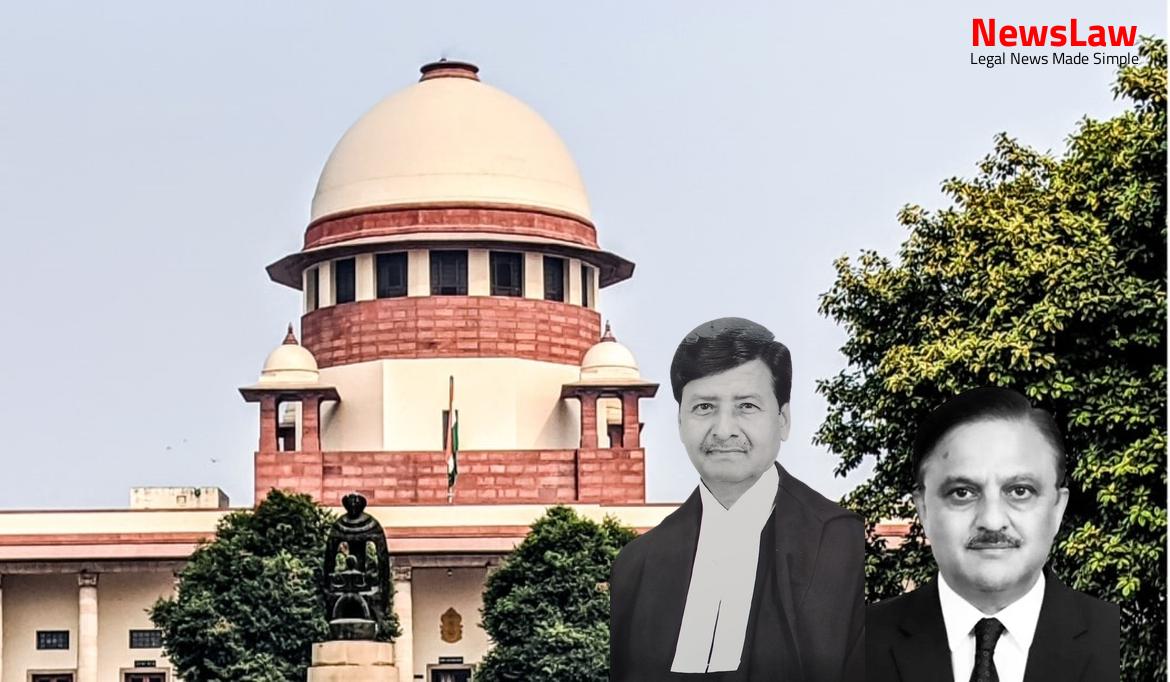Explore the in-depth legal analysis by the court regarding the interpretation of an exclusion clause in an insurance policy. The court’s decision sheds light on the burden of proof in cases where ambiguity arises, emphasizing consumer protection in insurance claims. Discover the nuances of insurance law and the significance of legal clarity in resolving disputes.
Facts
- The appellant lodged a claim based on the policy due to the incident on 23 March 2010 involving anti-social individuals entering the factory premises demanding money and jobs.
- The appellant reported substantial damage to factory, machinery, and equipment, with the incident aimed at terrorizing management and workers.
- Surveyor assessed the loss at Rs. 89,43,422, while the premium paid was Rs. 2,20,462.
- The respondent-insurance company repudiated the claim citing the Terrorism Damage Exclusion Warranty in the policy.
- Complaint before the Commission sought Rs. 1,51,35,780 in monetary relief due to the repudiated claim.
- The Commission dismissed the Consumer Complaint No. 165 of 2012 filed by the appellant, upholding the repudiation based on the Exclusion Clause.
- Appellant had a Standard Fire and Special Perils Policy for the Engineering Workshop and Plant in Jharkhand with a total sum assured of Rs. 26,00,00,000.
- Separate claim of Rs. 25,00,000 was made for agony and harassment due to the policy repudiation, along with interest at 18% p.a on the claimed amounts and cost amount of Rs. 10,00,000.
- This appeal under Section 23 of the Consumer Protection Act challenges the Commission’s decision.
- The damage to the factory and equipment of the appellant was determined to be the result of an act of terrorism.
Also Read: Admission Deadline Adherence in Medical Courses
Arguments
- The petitioner submitted that the police filed a closure report indicating that the incident was not a case of terrorism.
- The investigation report from the insurance company also did not conclusively prove terrorist involvement.
- The petitioner’s counsel referred to legal definitions of terrorism under acts like the Unlawful Activities (Prevention) Act.
- The warranty in question excluded losses related to actions taken against terrorism.
- Insurance company has the burden to prove the Exclusion Clause was attracted in the case.
- The provisions of the Amendment Act of 1908 being applied indicate the loss was due to a terrorist act.
- The burden was on the appellant to show liability under the policy.
- The appellant failed to discharge the burden according to the respondent.
- The insurance contract should be construed in favor of the insurer in case of ambiguity.
- Surveyor appointed by the respondent quantified damage at approximately Rs.89,00,000/-.
- 120 people entering the premises with weapons and causing destruction indicated a terrorist act.
- The police applied various sections of the Indian Penal Code and the Amendment Act of 1908 to the incident.
- The incident was considered a case of unlawful association as per the provisions of the Amendment Act of 1908.
Also Read: From Nominee to Disqualified: Supreme Court Scrutinizes Age Evidence, Declares Election Invalid
Analysis
- The Exclusion Clause in the insurance policy excludes coverage for any loss, damage, cost, or expense directly or indirectly caused by terrorism, regardless of any other contributing cause or event.
- An act of terrorism is defined as an act that involves the use of force or violence, or the threat thereof, by any individual or group for political, religious, or similar purposes to influence government or instill fear in the public.
- The policy covers damage to the insured property caused by violent means, but excludes damage caused by unlawful occupation, prevention of access, burglary, theft, or malicious acts.
- The decision to repudiate the policy cannot be sustained as it was based on the Preliminary Survey Report, Investigation Report, and Final Survey Report.
- The repudiation was made claiming that anti-social persons were attempting to create terror for ransom.
- The incident involved damage to the blast furnace control room and other areas, theft of mobile phones, cash, walkie-talkies, and materials related to PIG Irons.
- The Investigator appointed by the respondent could not conclusively prove the involvement of Maoist or similar groups in the incident.
- The FIR and Closure Report did not mention acts of terrorism as defined in the Exclusion Clause of the policy.
- The burden of proving that the loss/damage was not caused by malicious acts falls upon the insured under the policy.
- The policy explicitly covers liability arising from damage due to riots or the use of violent means.
- The Commission erred in applying the Exclusion Clause without sufficient evidence of terrorism.
- The Survey Reports do not shed light on whether the incident constituted an act of terrorism under the policy’s definition.
- The Exclusion Clause defines terrorism based on actions committed for political, religious, ideological, or similar purposes.
- The Survey Reports lack factual findings regarding the incidents that led to the loss.
- In cases where there is an express clause excluding insurance cover, it is the responsibility of the insurer to prove that the case falls under the exclusion.
- If there is any ambiguity in the contract of insurance, it should be interpreted in favor of the insured party.
- Previous court cases like United India Insurance Co. Ltd v. Pushpalaya Printers, Peacock Plywood (P) Ltd. v. Oriental Insurance Co. Ltd., and United India Insurance Co. Ltd. v. Kiran Combers & Spinners have supported the principle of construing insurance contracts in favor of the insured in cases of ambiguity.
- The burden of proof to show that a case falls under an exclusion clause lies with the insurer, and in this case, the respondent failed to do so.
- The definition of acts of terrorism provided in the exclusion clause of the policy will govern the rights and liabilities of the parties as it is part of the concluded contract.
- Quantum of the amount payable to the appellant needs to be determined based on evidence and valuation reports
- The valuer appointed by the respondent-company has assessed the loss caused
Decision
- The impugned judgement and order is set aside.
- An adjudication is to be made at approximately Rs. 89,00,000/-.
- The issue of the quantum of amount payable to the appellant under the insurance policy is left open for the decision of the Commission.
- The respondent is directed to deposit Rs. 89,00,000/- with the Commission within one month.
- The appellant has the liberty to file an application for withdrawal of the deposited amount.
- The Commission will decide on the withdrawal application in accordance with the law.
- The appeal is allowed with no order as to costs.
- Consumer Complaint No.165 of 2012 filed by the appellant is restored to the file.
- After allowing further evidence, the Commission will decide the complaint in accordance with the law and the judgement.
Case Title: NARSINGH ISPAT LTD Vs. ORIENTAL INSURANCE CO LTD (2022 INSC 502)
Case Number: C.A. No.-010671-010671 / 2016



